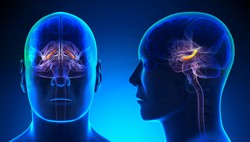A new view on declarative memory
Recent studies have revealed the extraordinary phenomena of the rapid acquisition of novel arbitrary associations by adults with severe anterograde amnesia due to extensive MTL lesions. This contradicts current thinking on dual declarative memory systems to offer a radically different mechanism, known as fast mapping (FM), for directly acquiring semantics without the aid of the hippocampus. The hippocampus plays important roles in the consolidation of information from short-term memory to long-term memory, and in spatial memory that enables navigation. Semantics refers to knowledge we acquire throughout our lives. Neural substrates and cognitive mechanisms underlying FM learning were examined by the EU-funded project FAST MAPPING (Fast mapping: How to acquire new declarative memories independently from the hippocampus?). FM is a process whereby a new concept is learned based only on a single exposure to a given piece of information. It supports the acquisition of vocabulary in children who do not have a mature hippocampus. The children actively infer the meaning of new words by generating hypotheses based on contextual clues or by the way the words are used in a sentence. Researchers initially explored the neural basis of FM by designing an FM task and testing patients suffering from Alzheimer’s disease (AD) and healthy older patients. Results suggest that FM is less sensitive to atrophy of the hippocampus and more sensitive to anterior and posterior neocortical degeneration, which is part of AD. It also seems efficient in learning new associations in patients with memory disorders. A second experiment investigated cognitive mechanisms underlying FM by designing a new way of demonstrating how previous knowledge and inference used in combination with repeated exposure can guide people to learning new words. Lastly, scientists designed rehabilitation tools for patients who cannot learn new information. FAST MAPPING results indicate that patients with episodic memory disorders and MTL damage can learn new associations with the help of FM, challenging the accepted view of episodic memory.







